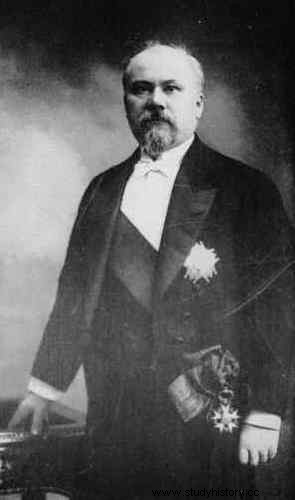Raymond Poincaré, born August 20, 1860 in Bar-le-Duc (Meuse) and died October 15, 1934 in Paris, was a French statesman, cousin of the mathematician Henri Poincaré.

Trained in politics by Jules Develle, where he was director of cabinet at the Ministry of Agriculture in 1886, then elected general councilor in the Meuse, Poincaré forged a reputation as a moderate and conciliatory politician from his first term as deputy for the Meuse in 1887. This did not prevent this son from polytechnician, himself a famous lawyer in Paris and reluctantly entered the political scene, to impose himself there quickly.
At thirty-six, he had already been minister three times:of public education (1893), under Dupuy, then of finance 1894-1895 after the electoral victory of the moderates, and again in charge of public education in 1895. He was a strong supporter of secularism, but on condition that it be freed from all anticlericalism, which naturally distanced him from the radicals and the socialists. Indeed, Poincaré advocated "a neutral school", whose vocation would have been to produce true patriots. He can be considered the leader of the moderates, the Republican right.
During the Dreyfus affair, he adopted a very cautious attitude even if he was one of those who wanted to stifle the scandal, like all opportunists who favor reasons of state over all other considerations. He finally rallied to the Dreyfusard camp, more out of legalism than conviction. This did not bring him closer to the left, however, from which he kept his distance. He absolutely did not support the policy of Waldeck-Rousseau and even less that of Émile Combes. He preferred the Senate to the Chamber where he represented the Meuse between 1903 and 1913 then between 1920 and 1934. A fine consecration, he was elected to the French Academy in 1909.
He was President of the French Republic between 1913 and 1920, in a period marked by the First World War during which he was the architect of the political and social Sacred Union, alongside René Viviani or Georges Clemenceau.
Already, from July 13 to 23, 1914, he made an official trip to Russia to strengthen the alliances two weeks after the Sarajevo bombing. On August 4, his message was communicated to the Chambers by Viviani:France “will be heroically defended by all its sons, nothing of whom will break the sacred union before the enemy”.
He does not hesitate, sometimes at the risk of his life, to come to the front (essentially Meuse and Somme) in order to judge the morale of the troops and the displaced populations. However, after Clemenceau was appointed President of the Council in 1917, his role became more discreet.
é
In 1920, while his mandate was not completed, he was elected senator of the Meuse. Very quickly, he agreed to become chairman of the board again, in place of Aristide Briand whom Alexandre Millerand, newly elected President in 1920, had dismissed from his post, not approving the way in which he conducted his foreign policy. Faced with Germany, which refused to pay “war reparations”, he resorted to force, causing the Ruhr to be occupied; but his policy of budgetary rigor made him unpopular and, in 1924, after the victory of the Cartel des gauches, he had to submit his resignation, just like President Millerand.
He was recalled in 1926 in the face of the scale of the financial crisis; he then formed a ministry of unity, retaining Briand in Foreign Affairs, and returning to a policy of financial austerity; the Germinal franc was replaced by the Poincaré franc of a value five times less, a devaluation which was limited to confirming the real exchange rate. Sick and tired, he resigned and retired from the public scene in 1929. Died in Paris in 1934, he is buried in Nubécourt, in his native department.
